Coronavirus – Impact on International Students
May 7, 2020The onslaught of the Coronavirus has caused much pain, suffering and hardship to Australians and people all over the world.
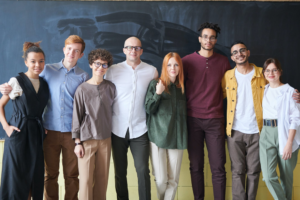 During this time of fear and uncertainty we appreciate the Australian and New South Wales (NSW) Government’s efforts to stop the spreading of this contagious and deadly disease through social distancing and isolation. This has however, resulted in the loss of many jobs. The impact of this situation is causing much devastation among vulnerable International Students. Many have found themselves unemployed and, therefore, left stranded and helpless during this time of uncertainty “feeling defeated by this unknown enemy.”
During this time of fear and uncertainty we appreciate the Australian and New South Wales (NSW) Government’s efforts to stop the spreading of this contagious and deadly disease through social distancing and isolation. This has however, resulted in the loss of many jobs. The impact of this situation is causing much devastation among vulnerable International Students. Many have found themselves unemployed and, therefore, left stranded and helpless during this time of uncertainty “feeling defeated by this unknown enemy.”
As far as is known 700,000 students attend Australian Universities and Tertiary institutions. Thousands are stranded with no safety net during this pandemic. The article from The Guardian on Sunday (‘We feel abandoned’: international students in Australia facing coronavirus alone) highlights the plight of these students. One student speaks of having to pay fees and bills while trying to live off her limited saving. She speaks of her disappointment with the lack of any moral support from the Australian Government.
According to Mr Baid, (University of NSW Postgraduate Councillor), many are worried about their courses or capacity to survive and stay in Australia.
Even if they wanted to, it is impossible for some students to return home because of the ‘lockdown situation’, inability to travel and/or the lack of funds. I have also been told that some have skipped meals, and many have asked for assistance from a Foodbank in Sydney.
I have spoken to all three students who were interviewed, and I can also verify what they have said from my own experience and contact with International Students, in my ministry with Trafficked Persons.
International students have contributed much to the social and cultural fabric of our Australian society. Moreover, International Students, through their fees to Educational Institutions contribute $39 billion to the Australian Economy. In addition, they further contribute to the Economy through their living expenses, rental payments and tax payments.
On 22 April 2020, in recognition of the contribution of the 26,000 Temporary Visa Holders, including students who have lost their jobs due to the Coronavirus restrictions, Tasmanian Premier Peter Gutwein announced that a $3 million support program had been established for those who are experiencing hardship and income loss. We commend Premier Gutwein who said we will “not turn our back on temporary visa holders” in Tasmania.
The South Australian Government has also announced a $13.8 million International Students Support Package to which all International Students enrolled and living in Australia are eligible to apply.
Since then, Victoria and Australian Capital Territory have also promised support for International Students.
NSW and Queensland readers may be able to influence the decisions of their Governments, if they were to write to the State Premiers and Opposition Leaders, urging them to adopt an appropriate program to support these International Students.
Margaret Ng rsj
Image: Photo of people standing near blackboard by fauxels obtained from Pexels. Used with permission.
Julian Tenison Woods: A Life – Chapters 5th to 8th
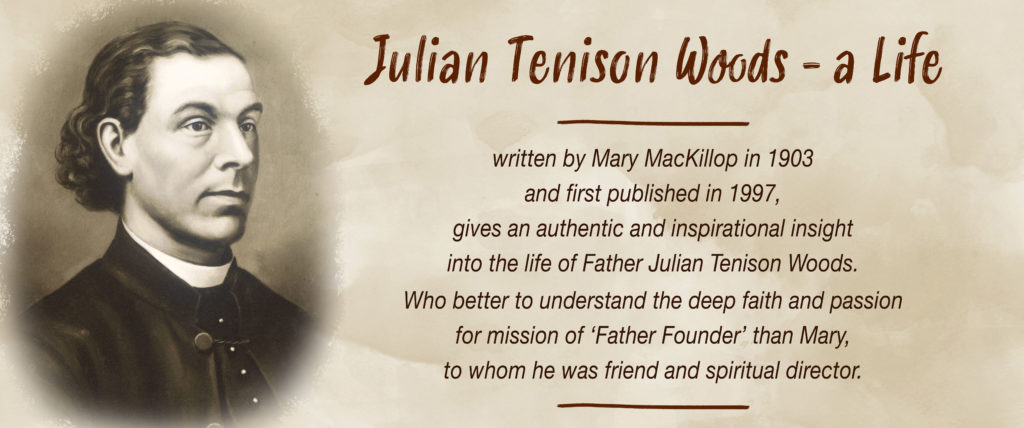
Chapters 5th, 6th, 7th and 8th
On 4 January 1857, Mr Woods was ordained priest by Bishop Murphy in St Patrick’s Church, West Terrace, Adelaide, S.A.
Before the month was ended, the Bishop decided to give the young priest a very important duty – the establishment of a permanent Catholic Mission in the South Eastern portion of South Australia – appointing him to the charge of a district that included an area of over 22,000 square miles. He was to be the only Catholic priest in that wide expanse of country, which is included between the River Murray on the North and West, the boundary of Victoria on the East, and the Southern Ocean.
St Joseph the Worker Feast Day 2020
May 1, 2020St Joseph the Worker Feast Day 2020.
Saint Joseph, the Worker is the universal Saint for whom people in all times have held a great fondness.
- In Matthew’s Gospel we hear of Joseph as the Just Man, living in Nazareth.
- Saint Teresa of Avila, “I took for my patron St. Joseph and recommended myself earnestly to him.”
- Pope Francis, while attending Family Celebrations in the Philippines in 2015, had this to say of Joseph “I have a great love for St. Joseph because he is a man of STRENGTH and SILENCE. I have a statue of St Joseph asleep on my desk, and I put my written intentions under the statue each evening.”
- James K Baxter (NZ) poet said: “Dear tolerant Saint…..You remind me of what I was born for: to accept the daily grind as God’s will.”
- To Mary MacKillop, Saint Joseph was her Saint. In 1873, she wrote to the Sisters “in Joseph’s care I leave you.”
“May Day ” has long been dedicated for labour and working people. This was sponsored by Communist thought. In 1955, Pope Pius XII established the Feast of St. Joseph the Worker. This was to give all workers a model and protector, thereby affirming the dignity of work. Today we sometimes witness this principle negated; the value upheld in the workplace is often “profit before people.”
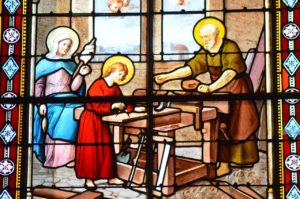 Traditionally, the artist’s image of Joseph at the carpenter’s bench was where we met Joseph. In her book “In the Spirit of Joseph”, Mary Cresp RSJ shares insights which lead us to know that Joseph was a skilled builder working with hard substances…..wood and stone. He would have been well known and respected in his village.
Traditionally, the artist’s image of Joseph at the carpenter’s bench was where we met Joseph. In her book “In the Spirit of Joseph”, Mary Cresp RSJ shares insights which lead us to know that Joseph was a skilled builder working with hard substances…..wood and stone. He would have been well known and respected in his village.
The devoted family man’s work would also have included tending a garden to supply daily family needs. As was the custom, he would have kept small animals …sleep and goats.
Joseph demonstrated the value of hard honest work and the importance of sharing his skills in his village. Jesus was one of his apprentices.
Our 26th Chapter called us “to live on the edge of our existence with Joseph.” The time is now, as we pause to hear “the cry” of tens of thousands of people who have lost their jobs as a result of the COVID-19 virus. So that wherever we are, we will remember them.
As we celebrate the Feast on 1 May 2020, we ask Joseph to pray with us and for us:
Joseph, may we and those we know and love experience your loving and provident care in our lives.
Maureen Cahill rsj
In Good Faith Podcast
April 30, 2020Sr Rita Malavisi was recently featured in a podcast titled ‘In Good Faith’ speaking about her ministry for the organisation ‘A Nun’s Life’.
As stated on ‘A Nun’s Life’ website, “In Good Faith features guests who are nationally known for their ministry in spirituality, religious life, discernment, and many other areas.”
You’re invited to listen to Sr Rita’s podcast below:
In Good Faith Podcast with Sr Rita Malavisi
Additionally, please find a link to ‘A Nun’s Life’ website below:
Baabayn Weaving and Reweaving
April 29, 2020Ruth Nelson shares a summary of “Baabayn Weaving and Reweaving: Just Sit and Be Quiet and Listen”, which she presented at the March Josephite Justice Network gathering.
 The research explores the model of healing that is offered at Baabayn Aboriginal Corporation, through a participatory action research process made up of a series of yarns. Yarning is an ancient method of holding conversations in a circle, where each person is equally valued, and where storytelling and reflecting is a relaxed way of gathering and analysing information. In this series of yarns, it is hoped that the participants contribute to the dream of building and strengthening Baabayn’s model of healing the harm done by colonisation and intergenerational trauma.
The research explores the model of healing that is offered at Baabayn Aboriginal Corporation, through a participatory action research process made up of a series of yarns. Yarning is an ancient method of holding conversations in a circle, where each person is equally valued, and where storytelling and reflecting is a relaxed way of gathering and analysing information. In this series of yarns, it is hoped that the participants contribute to the dream of building and strengthening Baabayn’s model of healing the harm done by colonisation and intergenerational trauma.
The paper first discusses the main cause of trauma in the community. Colonisation disrupted everything. It is important to understand the scale of loss Aboriginal people faced in the past, the destruction of lore and law, the loss of family in the Stolen Generation, the erosion of people’s connections to land, family and language. That violent disruption continues today in many ways including through deaths in custody, and in discrimination people experience in their contacts with systems which do not understand their way of speaking, thinking or interacting with the world
Baabayn is a space shaped by female elders. The word is reflective of the female energy and spirit of the centre. It has become healing for individuals, family and the community shaped by the values of Belonging, Unity, Respect, Culture, Healing, Connection, and Welcome. These values are largely expressed through the creation of space for listening and talking. Participants feel less alone when they visit Baabayn and some talked about sharing their experiences and problems in the space without feeling judged. Participants feel that having a regular place to freely talk and listen can stop suicide and self-harm.
The feeling created at Baabayn connects people with their culture, bringing together a diverse collective of over 20 Aboriginal groups. The feeling described is one of being grounded, of connecting spiritually and culturally to one’s people. It isn’t the services or instruction in itself that provides grounding, but wisdom, knowledge, yarning, sharing and laughing in a safe nurturing energetic cultural space.
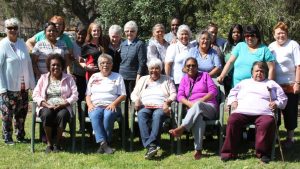
The full research article by Cassandra Ebsworth, Bernard Hoffman, Ruth Nelson, Aunty Margaret Farrell, Ann-Marie Melito, Lilli Barto, Aunty Pat Fields, Leah Pearson, Racheal Munro, Aunty Christine O’Sullivan, (in photo to the left) can be found in Issue One of The Activist Practitioner.
Ruth Nelson
Josephite Justice Network
Truly grateful for the Government’s actions to keep Australians secure and healthy
“The next city we shall inhabit is still in our saddlebags”.
The final verse of David Malouf’s poem, Between Towns, is strikingly apt for this time.
 With Malouf, we journey tentatively through this precarious time, while we continue to wonder what “the next city” will be like. The crossroads of Coronavirus confront us with many choices, inevitably both rich and bleak, and we keep asking how our actions – now and in the next moment of the “darkness between towns” – will help to determine the kind of community and world we will become.
With Malouf, we journey tentatively through this precarious time, while we continue to wonder what “the next city” will be like. The crossroads of Coronavirus confront us with many choices, inevitably both rich and bleak, and we keep asking how our actions – now and in the next moment of the “darkness between towns” – will help to determine the kind of community and world we will become.
We are truly grateful for the Government’s actions to keep Australians secure and healthy during these terrible days. There is no doubt that the JobKeeper and Jobseeker schemes, designed to support the Australian community, are enormously valuable initiatives, which will make a difference to millions of Australians.
Simultaneously, however, as we are caught up in the news bulletins and unprecedented stories of sickness and death, we are confronted also by the plight of those trapped and seemingly abandoned at the edges of our community.
 Right across Australia, we have seen Church and community leaders, justice advocates and many individuals expressing concern for the more than 1.5 million members in our community who find themselves missing out on Government support at this time. Casual workers, asylum seekers, refugees, migrant workers, international students, and homeless people have been totally disregarded in the Government’s support packages. As a consequence, they find themselves facing unprecedented crises.
Right across Australia, we have seen Church and community leaders, justice advocates and many individuals expressing concern for the more than 1.5 million members in our community who find themselves missing out on Government support at this time. Casual workers, asylum seekers, refugees, migrant workers, international students, and homeless people have been totally disregarded in the Government’s support packages. As a consequence, they find themselves facing unprecedented crises.
The Prime Minister has stated unequivocally that this is “no longer about entitlement. It’s about needs.” It seems, very sadly, that the above groups have been excluded from this belief and description.
In urging the Government to show compassion, Catholic Church leaders have described community members accurately and poignantly:
As we journey towards the “next city”, it’s our hope that the Government will extend assistance to those excluded at this time, and that the lessons of this time will lead us to become a more compassionate, more caring society. We continue to hold all these disregarded members of our communities in our prayer, our action and our advocacy. “We set forth together into unknown country,” continuing to journey hopefully “in the darkness between towns – while shadows pause and change a wheel.”
Jan Barnett rsj
Photo: Not today COVID-19 by cottonbro from Pexels. Used with permission.
Photo: Students holding each others hands by Fauxels obtained from Pexels. Used with permission.
ANZAC Day 2020
April 25, 2020ANZAC Day is a significant day for all Australians and is often a time for private reflection.
 Due to the global outbreak of COVID-19 (Coronavirus), the Australian Government has cancelled overseas ANZAC Day ceremonies for 2020 on the Gallipoli peninsula in Turkey, near Villers-Bretonneux in France, including the Australian service at the ‘Digger’ Memorial, Bullecourt, Hellfire Pass in Thailand, Sandakan in Malaysia and Isurava in Papua New Guinea.
Due to the global outbreak of COVID-19 (Coronavirus), the Australian Government has cancelled overseas ANZAC Day ceremonies for 2020 on the Gallipoli peninsula in Turkey, near Villers-Bretonneux in France, including the Australian service at the ‘Digger’ Memorial, Bullecourt, Hellfire Pass in Thailand, Sandakan in Malaysia and Isurava in Papua New Guinea.
Australians are encouraged to privately commemorate Anzac Day, in-line with the latest health advice, and to watch the service at the Australian War Memorial. While the Service is not open to public attendance, the Service will be nationally broadcast, to enable the public to watch from their own homes. There will also be a range of other commemorative activities that will be broadcast throughout the day. The Department of Veterans’ Affairs is working with state and territory governments as they finalise their ANZAC Day plans and will update this page when these details are confirmed.
We hope you enjoy reading this ANZAC Day article by Mike Gourley published in Tui Motu InterIslands Magazine this month:
Photos: Obtained from the Editor at Tui Motu InterIslands Magazine. Used with permission.
Foundation Day Whanganui, Aotearoa New Zealand
April 24, 2020Celebrating the 140th anniversary of Aotearoa New Zealand Foundation in Whanganui: 24 April 1880
At the time of the 1980 Centennial celebrations marking the arrival of the Sisters of Saint Joseph in Whanganui, Aotearoa New Zealand, Mary Gullery penned the poem below to mark the occasion.
A past pupil of the Sisters of Saint Joseph and Sister Genevieve Greig’s sibling, Mary was a recognized writer and poet. In the Ballad of the Wakatu, she captures the founding spirit that was evident in those first four sisters who spoke of coming “gaily down from Bathurst to Sydney” to begin their journey into the unknown. She also captures the energy and anticipation with which the people of Whanganui awaited the arrival of the sisters.
With the passing of a further forty years, that energetic spirit captured by Mary still moves us to face a changing future.
The Ballad of the Wakatu by Mary Gullery
In your children’s houses light a candle flame.
Tell your children’s children how the first Sisters came.
How all the bells were ringing, the people still abed,
“Dear God! What can have happened?” the Irish mothers said.
A messenger comes running, glad the news he tells,
News like wildfire spreading, with peal on peal of bells.
“Rise up from your sleeping, sound the pipe and drum!
The ‘Wakatu’ is berthing! The Nuns, the Nuns have come!”
Mr Lloyd, the Band, Father Kirk, the Mayor,
It was hard to understand how fast they all got there.
Through the streets of Wanganui in the early morning sun,
Speedily assembled, a welcome was begun.
For the coaster had travelled sooner than expected,
And though the school committee was most hastily collected,
That night they held their concert, and it became their pride
That the hall was overflowing and a hundred stood outside.
The parents in the fledgling town had longed for such a day,
And begged this boon as often as they knelt down to pray.
The refinements that the Nuns could bring, the culture there would be,
And religion to be handed down to all posterity.
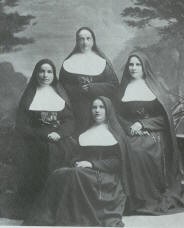
From far away Australia came the answering of their prayer,
With Sisters Hyacinth, Joseph, Teresa and Clare.
Those first sisters are sleeping now, their work was truly done.
And others carry on the task so well begun.
Their mark is on New Zealand right from shore to shore.
A hundred years have passed away. The bells ring out once more!
All the bells are ringing for a Jubilee,
For giving thanks and begging grace on years as yet to be.
When heritage is vaunted and histories prevail,
Gather in the children close and tell again the tale,
How the coaster brought to harbour in those early years
A blessing on the sacrifice of Catholic pioneers.
John Bosco Kendall rsj
